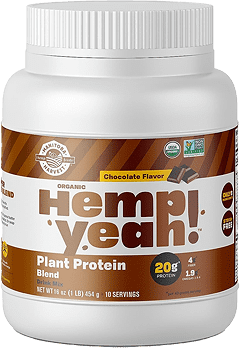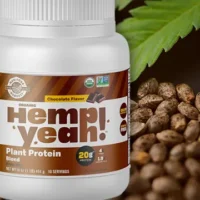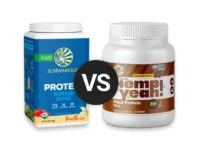Knowledge BaseYou're Questions Answered
Is hemp protein powder bad for you?
Hemp protein powder is a plant-based protein supplement made from the seeds of the hemp plant (Cannabis sativa). It is valued for its nutritional content, including protein, fiber, and essential fatty acids. Generally, hemp protein powder is considered safe for most people and can be a healthy addition to the diet. However, there are some considerations and potential concerns to be aware of, depending on individual health conditions and dietary needs. Below, we explore the benefits and considerations related to the consumption of hemp protein powder.
Benefits of Hemp Protein Powder
1. Nutrient-Rich
Hemp protein powder provides a range of nutrients beyond just protein. It contains essential fatty acids, such as omega-3 and omega-6, in a ratio considered beneficial for human health. It is also a good source of dietary fiber, vitamins, and minerals, including iron, magnesium, and zinc1.
2. Easily Digestible
Hemp protein is known for its digestibility, meaning it is easily absorbed and utilized by the body. It contains edestin and albumin, two proteins that are readily digestible and rich in essential amino acids. This makes hemp protein a good choice for those who may have difficulty digesting other protein sources2.
3. Hypoallergenic
Hemp protein powder is free from common allergens such as dairy, soy, and gluten. This makes it a suitable option for individuals with allergies or sensitivities to these ingredients. It is also a vegan protein source, making it suitable for plant-based diets.
Considerations and Potential Concerns
1. THC Content
Hemp seeds used to produce hemp protein powder come from a strain of the Cannabis sativa plant with low levels of THC (tetrahydrocannabinol), the psychoactive compound found in marijuana. Legally produced hemp protein powder contains only trace amounts of THC, well below the level needed to produce any psychoactive effects. However, those subject to drug testing should ensure their product comes from a reputable source to avoid potential issues3.
2. High Fiber Content
Hemp protein powder is high in fiber, which can be beneficial for digestive health. However, for some people, especially those not used to a high-fiber diet, this can cause digestive discomfort such as bloating or gas. It is advisable to start with a small serving and gradually increase intake to allow the digestive system to adjust4.
3. Oxalates
Hemp protein powder contains oxalates, which are naturally occurring compounds found in many plant foods. High oxalate intake can be a concern for individuals prone to kidney stones, as oxalates can bind with calcium and form crystals. Those with a history of kidney stones should consult with a healthcare professional before consuming large amounts of hemp protein5.
- Callaway, J. C. (2004). Hempseed as a nutritional resource: An overview. Euphytica, 140(1-2), 65-72.
- House, J. D., Neufeld, J., & Leson, G. (2010). Evaluating the quality of protein from hemp seed (Cannabis sativa L.) products through the use of the protein digestibility-corrected amino acid score method. Journal of Agricultural and Food Chemistry, 58(22), 11801-11807.
- Leizer, C., Ribnicky, D., Poulev, A., Dushenkov, S., & Raskin, I. (2000). The composition of hemp seed oil and its potential as an important source of nutrition. Journal of Nutraceuticals, Functional & Medical Foods, 2(4), 35-53.
- Slavin, J. L. (2013). Fiber and prebiotics: mechanisms and health benefits. Nutrients, 5(4), 1417-1435.
- Mitchell, T., & Kumar, P. (2011). Oxalate nephropathy as a consequence of excessive vitamin C ingestion. Kidney International, 80(11), 1194-1198.
Related Questions
Related Reviews
Protein vs Protein

Your Answer
We are a participant in the Amazon Services LLC Associates Program, an affiliate advertising program designed to provide a means for us to earn fees by linking to Amazon.com and affiliated sites.




